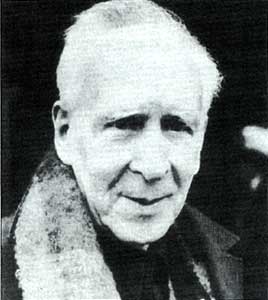
...For since a necessary function in the history of our salvation was fulfilled by so great a mass of "unbelievers" -- not indeed in that they were in formal error or in a state of degradation, but in that there is to be found in their beliefs and consciences a certain groping after the truth, its painful preparation or its partial anticipation, discoveries of the natural reason and tentative solutions - so these unbelievers have an inevitable place in our humanity, a humanity such as the fall and the promise of a Redeemer have made it.
There is no comparison between their role and that of the scaffolding which, necessary as it is in the construction of a building, is discarded once the building is complete without further thought of what will become of it. For if the heavenly Jerusalem is built of living stones, it is also living beings that go to make its scaffolding. In other words, humanity is made up of persons who have all the same one eternal destiny, in whatever category or century their birth has placed them; their relationships cannot be envisaged, then, as just external ones, as if some existed only to prepare suitable conditions for the development of others, as in Renan's paradox of the coming of a superman. In spite of great differences of understanding and function, all members of the human race enjoy the same essential equality before God.
As "unbelievers" are, in the design of Providence, indispensable for building the Body of Christ, they must in their own way profit from their vital connection with this same Body. By an extension of the dogma of the communion of saints, it seems right to think that though they themselves are not in the normal way of salvation, they will be able nevertheless to obtain salvation by virtue of those mysterious bonds which unite them to the faithful. In short, they can be saved because they are an integral part of the humanity which is to be saved.
--Henri de Lubac, Catholicism: Christ and the Common Destiny of Man, pp. 232-233

2 comments:
I love this book by De Lubac. He was very ecclectic in its compilation, and it is very well written.
I like to think the most beautiful meditation on the role of non-believers comes at the beginning of St. Therese's Story of A Soul, where she wonders why she has the privilege of knowing Christ, while "savages" in the distant jungles don't even know His name. Then comes the adolescent image of a field of flowers in which all men, from that humble Carmelite nun to the Pygmy shooting a monkey out of a tree are all part of that multi-colored meadow that is presented as a bouquet to God.
I don't hope that all be saved. I take very seriously the passages in the Gospel that many are called by few are chosen and the way of perdition is indeed broad and many are walking on it. But those injunctions are primarily FOR ME and not a criterion to judge the rest of the human race. At the end of the day, we will be judged on how much we have loved. Have I loved enough? Have I loved even those who do not know Christ or refuse Him, as Christ loves them?
By the way, is De Lubac' Corpus Mysticum out in English yet?
Please give us more on Rahner's ideas about original sin and also De Lubac on unbelievers. Perhaps you can direct us to resources that we non-professional theologians can understand. Thanks for the great posts.
Martin
Post a Comment